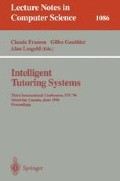Abstract
In this paper we present our approach in learner modelling for CSCL environments. Learner models provide the information needed in order to support awareness and promote opportunities of effective collaboration and learning in a networked community of practice. The learner model is proposed as a set of beliefs hold by a software agent about the capabilities, commitments and learning goals of the learner. By exchanging their beliefs about the capabilities of their learners the software agents promote the creation of zones of proximal development in the learning group, by proposing tasks based on the group-based knowledge frontier of their learners, which represents the assistance and learning possibilities of the learner in a community of practice.
Preview
Unable to display preview. Download preview PDF.
References
Ayala, G., Yano, Y.: Interacting with a mediator agent in collaborative learning environments. Symbiosis of Human and Artifact: Future Computing and Design for Human-Computer Interaction, A20. Y. Anzai, K. Ogawa and H. Mori (eds.), Advances in Human Factors/Ergonomics. Elsevier Science Publishers (1995) 895–900.
Self, J.: Formal approaches to student modelling. Student Modelling: The key to individualized knowledge-based instruction. Greer, Jim E. and McCalla, Gordon (eds.) NATO ASI Series. Springer Verlag. (1994) 295–352.
Wan, D., Johnson, P.: Experiences with CLARE: a computer-supported collaborative learning environment. Int. J. Human-Computer Studies 41, (1994) 851–879.
McManus, M., Aiken R. M.: The group leader paradigm in an intelligent collaborative learning environment. Proceedings of AI-ED 93, AACE. Paul Brna, Stellan Ohlsson and Helen Pain, (eds.) (1993) 249–256.
Norrie, D. H., Gaines, B. R.: The learning web: a system view and agent-oriented model. International Journal of Educational Telecommunications, 1(1), (1995) 23–41.
O'Malley, C.: Designing computer support for collaborative learning. Computer Supported Collaborative Learning. Claire O'Malley (ed.). Springer-Verlag, (1995) 283–297.
Shoham, Y.: Agent-oriented programming. Artificial Intelligence 60, (1993) 51–92.
Vygotsky, L. S.: Mind in society: the development of higher psychological processes. Harvard University Press. London (1978).
Gutwin, C. Stark, G., Greenberg, S.: Support for Workspace Awareness in Educational Groupware. Proceedings of CSCL '95. Indiana University. http://www-csc195. indiana.edu/cscl95/gutwin.html (1995)
Bull, S., Pain, H., Brna, P.: Student modelling in an intelligent computer assisted language learning system: the issues of language transfer and learning. Proceedings of the International Conference on Computers in Education ICCE'93. Chan Tak-Wai (ed.) (1993) 121–126
Ayala, G., Yano, Y.: Intelligent agents to support the effective collaboration in a CSCL environment. Proceedings of the ED-MEDIA/ED-TELECOM 96 Conference, Boston, Mass. AACE (ed.) (1996) (to appear).
Dillenbourg, P., Self, J.: A framework for learner modelling. Interactive learning environments, Vol. 2, Issue (2), (1992) 111–137.
Author information
Authors and Affiliations
Editor information
Rights and permissions
Copyright information
© 1996 Springer-Verlag Berlin Heidelberg
About this paper
Cite this paper
Gerardo, A., Yoneo, Y. (1996). Learner models for supporting awareness and collaboration in a CSCL environment. In: Frasson, C., Gauthier, G., Lesgold, A. (eds) Intelligent Tutoring Systems. ITS 1996. Lecture Notes in Computer Science, vol 1086. Springer, Berlin, Heidelberg. https://doi.org/10.1007/3-540-61327-7_112
Download citation
DOI: https://doi.org/10.1007/3-540-61327-7_112
Published:
Publisher Name: Springer, Berlin, Heidelberg
Print ISBN: 978-3-540-61327-5
Online ISBN: 978-3-540-68460-2
eBook Packages: Springer Book Archive

